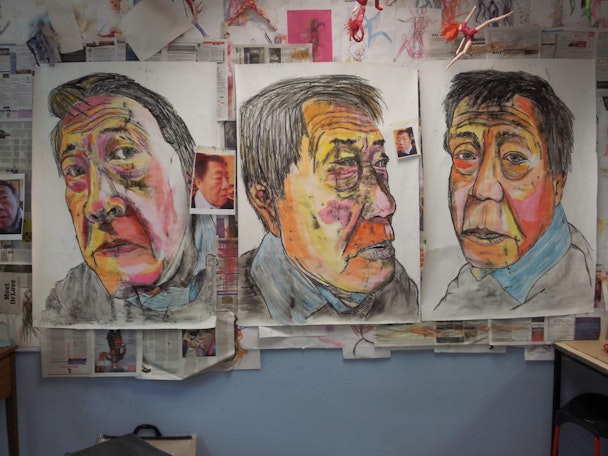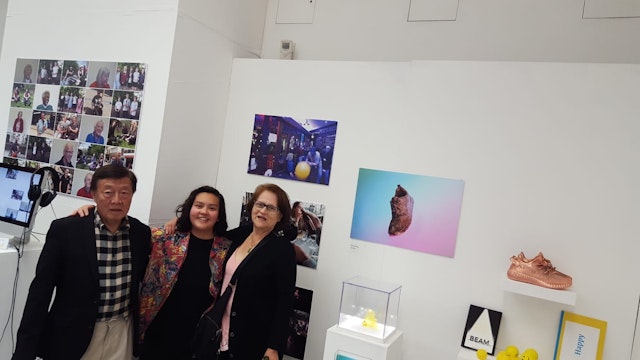Educating Ally: Brixton Finishing School founder on learning to be a better industry ally
In her new column for The Drum, Ally Owen catches up with individuals from underrepresented backgrounds to understand how she can become a better ally. Larisa Wong is her first guest.

Brixton Finishing School founder Ally Owens speaks to Larisa Wong about her experience in the industry
Our industry is now at a point where we all agree we have a talent crisis and need to diversify our intake. It’s about future-proofing our workplaces and delivering equitable outcomes for all.
But if you are from a group underserved by employers, getting in is one challenge and getting on is another. Allyship, therefore, is an important and readily available tool for all members of our industry to support long-term change for the better.
To me, being an ally is a daily, ever-evolving activity – it’s not a passive position. It’s about much more than being sympathetic towards those who experience discrimination or stating you believe inequality. Being an ally means possessing a willingness to act with and for others in pursuit of ending oppression and creating equality and equity, while educating yourself and listening to others’ experiences.
I’ve learned so much over the last few years of building up Brixton Finishing School and The Ad-Cademy. I’ve had the privilege of sharing spaces with a multitude of talented people from different communities and backgrounds to accelerate my education on how I can use my privilege as leverage for others.
If I can make this journey then so can you, and the good news is you can start at any point in the day or at any age – it’s never too late to upgrade yourself from the position of a bystander. I hope this series supports you in doing so.
In this series, you’ll get to meet a talent who will share their individual story so we can gain a deeper understanding of their experience and the interventions that will make us a better ally to them.
Today, my first guest is Larisa (Larrie) Wong, a Brixton Finishing School graduate who is also co-founder and creative at Pass The Sauce Studio and an advertising media manager at PPA.
Ally: So Larisa, thank you for being generous with your time and experience. Can you tell us a little bit about yourself?
Larisa: My name is Larisa Wong but all my friends call me Larrie. I’m a creative based in Epsom, Surrey. My mum is Columbian and my dad is Chinese – everyone always wonders how they managed to meet in a place like Epsom!
They emigrated to the UK to join the NHS as nurses in the 70s and met while in this very diverse profession. They both dedicated their lives to the care of others, which inspires me to this day.
Why did you decide to become a graphic designer?
I always loved drawing as a kid, so I wanted to do something creative. Becoming an illustrator or graphic designer was definitely not encouraged by my parents and since discussing this with other friends who are East or South Asian, it seems to be a common story.
My dad would have wanted me to go into a medical profession – a dentist or a doctor would have been ideal. Which is, I’m sure, the case for others from Asian backgrounds. Even after dedicating my final project to my dad he still wasn’t keen on the idea of me moving on to art school, but he was glad I was going to university. I’m the youngest of three so I think by the time it got to me, they just wanted me to do what made me happy and supported me through university.
What’s interesting is that in my house we have a number of beautiful paintings and it was only after my dad passed away suddenly last year that I found out my family believe that he had painted them. He was actually a talented painter himself, but I think he didn’t want to encourage my brothers and me to do it as a career, so kept it hidden. I must have got my talent from him.
This makes me think of all the talents that are hidden due to societal expectations and our failure to sell the industry to different cultural backgrounds. What can we do to make parents like yours feel more secure about your choice to be creative?
We need a program of education. My parents were clouded by a perception that creativity meant free internships and free work. I don’t blame them because that’s what our industry is known for. They needed to see there was money and security in a future role for me. A reassurance that a creative degree can be transferred into well-paid employment would have helped.
This was even hard for me to see myself. When I moved onto Bristol UWE to do an illustration degree and found a love for film and graphic design, I saw a disconnect between academia and the industry. We were regularly visited by freelancers who created art for brand campaigns and advertising. I was interested in how you got into the advertising agency rather than just freelance, but no one could really answer that for me.

So how did you find your way into the industry?
Well, it turns out you can just write to agencies asking for work experience – no one tells you that! When I discovered this I approached a number of agencies and both BBH and Adam&Eve got back to me and offered me a couple of weeks of experience each.
What were those experiences like?
Both agencies were really welcoming and lovely. In each experience I was in a small intake of talent and we sat in the middle of the agency, surrounded by stuff going on and attended lots of meetings as shadows. It was intense and insightful.
The only disheartening part was that in each of my groups some had come through familial connections. When I asked them how they got in they said they hadn’t had to apply, they were just placed through parental arrangements.
Nepotism aside, these experiences were incredible for learning and asking lots of questions. I really loved my time at both agencies. They just needed to ensure a diverse pool of candidates were picked for those placements.
What do you think the industry doesn’t appreciate about your experience?
How perilous breaking in is if you are without funds and connections. You are vulnerable to exploitation – to working for free, for example, and accepting a toxic environment. My first industry job – or what I thought was a job – was for a paid junior graphic designer role in Central London. My parents were ecstatic. I was given briefs straight away to work on and got stuck in, but I hadn’t signed a contract. After requesting to see it and raising my concerns, the agency kept pushing back and brushing them aside.
To cut a long story short, when I was eventually presented with the contract, it had ‘Internship for Shadowing’ as the title. It was an unpaid role yet it had been advertised as a paid role and I was not shadowing; I was working and working hard. I understood shadowing was an opportunity to learn, but this was a role I could do and I wasn’t learning anything. I was working.
After negotiating hard to get paid – we settled on a small % of minimum wage – the company eventually let me go a month later, on Boxing Day, saying ’we won’t be needing your services any more’. They had no problem with my work, they just had a problem with paying for me.
This is clearly a disgusting example of gaslighting and financial abuse! If you had had an ally, how would you have liked them to intervene?
I would have loved to have been in a union to be protected from this. I could have had my contract checked. There is a need for an entry-level talent union as lots of grads seem to be doing dodgy jobs. I felt beholden as I’d already started, but even just for a colleague to say ‘working for free is not normal or acceptable’ would have helped. I’ve never told anyone one about my experience before, mostly due to the embarrassment of it.
You mentioned you brought up your concerns – did you find it hard to speak up?
I found it really tough to bring up. I had just arrived and didn’t want to rock the boat. I mentioned it to another designer on my team and she said ’I told them not to advertise it as a paid job’.
That’s why I want to see more companies invest in support groups and HR systems that give people like me the confidence to speak up and not seem like we’re making a fuss.
Do you think these support groups are more important than ever, especially given the rise of #StopAsianHate in the face of growing hate crimes against Asian people?
Oh definitely! I’ve experienced it myself, when walking down the street and people will cross the road if I’m alone but not when I’m walking with a white person, combined with racist slurs shouted at me throughout the past year.
These spaces in companies become a safe haven to talk about our experiences and feel supported by our employers when we do experience these kinds of things.
I want to end with an important question – how can the industry be a better ally going forward and where can we go to educate ourselves?
I think efforts towards diversity need to be applied to all levels, not just us at the start of our journeys. When I look at applying for jobs now, I do check that the company has inclusivity, equality and diversity embedded throughout. But it’s important for allyship to be about empathy as well. Use your privilege to step into someone else’s shoes and stand up for them when they aren’t in the same room as you – you need to do it when they’re not looking too.
There are some great online resources to turn to if you want to know how to do this better. I recommend the Yo, Is This Racist? podcast and sketches like As/If’s ‘If Asians Said the Stuff White People Say’. It makes it accessible and is a great window into different cultures. Staying tuned in to what’s happening in these communities is also important – knowing the problem can help lead to a solution.
Ally Owen is an industry changemaker and founder of Brixton Finishing School.
If you would like to share your entry level experiences with Ally and provide further insight into the industry’s practices, please fill out this confidential questionnaire.
